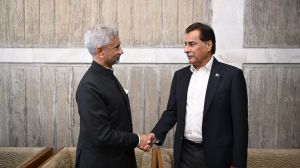Culture clash
Many in tiny Malta, an overwhelmingly white, Catholic nation, are angry about the growing numbers of black, mostly Muslim refugees, reports Mary Jordan from Valletta

Elegant white cruise ships slide into a perfect Mediterranean harbour, dropping hundreds of sun-blushed tourists to wander this former British colony8217;s narrow alleyways dotted with pubs and classic red English telephone booths. But just beyond these postcard-perfect scenes, an unwanted flotilla of rickety fishing boats carrying desperate Africans is arriving, too.
8220;See, there8217;s one of them now,8221; said Jesmond Saliba, pointing to an African man in jeans and sandals ambling along streets alive with white tourists.
Saliba, 34, drives a horse-drawn taxi, as his father did. For generations in his family, more visitors meant more money. But Saliba feels differently about the thousands of destitute Africans arriving here needing food, housing and medicine. 8220;We don8217;t have enough jobs for them, and it means more taxes for us,8221; Saliba said. 8220;This island is too small for them.8221;
About twice the size of the District of Columbia, Malta sits like a tiny sentry off southern Europe, 60 miles south of Sicily, looking across the sea at 2,000 miles of North African coast. In the past four years, more than 5,000 African immigrants have come ashore, most often making the 200-mile crossing from Libya in open fishing boats.
Nearly all were aiming for Italy and mainland Europe. But when their skiffs foundered or ran out of gas, they found themselves in a nation of just 4,00,000 people, where families have known each other for generations and people from the next village are considered outsiders.
8220;There is a feeling of 8216;My God, we are being invaded!8217;8221; said Katrine Camilleri, a lawyer with the Jesuit Refugee Service, which aids the boat people. 8220;It8217;s becoming more and more acceptable for people to openly say, 8216;We don8217;t want them.8217;8221;
8220;The whole of Europe is putting up the shutters,8221; said Martin Scicluna, an adviser to Malta8217;s justice minister. Maltese officials are pleading with other European nations to take custody of some of the boat people. So far, the Netherlands has taken 40; Germany has pledged to take a similar number.
8220;We don8217;t want a multicultural society,8221; said Martin Degiorgio, a leader of the Republican National Alliance, an anti-immigrant group formed last year. 8220;Haven8217;t you seen the problems it has brought to France and Britain?8221;
A British territory until 1964, Malta was a closer target than London for the Nazi Luftwaffe, and many residents interviewed said the relentless boatloads of foreigners made islanders feel as if they were under assault again.
Ruth Spiteri, a mother of three sitting with her children in a perfectly groomed park a few blocks away, said the migrants demanded too much. 8220;They don8217;t like the food we give them. They are aggressive with soldiers. They bring different diseases,8221; she said.
Some Maltese fault the government and a conservative church hierarchy for failing to explain the boat people8217;s plight and to calm unjustified fears. In that vacuum, they say, racist and xenophobic views have flourished. Recently, a Congolese man said a motorist deliberately rammed him, throwing him against a wall and injuring his legs.
The Rev. Paul Pace, acting director of Jesuit Refugee Service, said his group has been going into high schools asking students to imagine leaving their homes, without taking anything with them, and risking their lives to move to a new country. He said Malta must show the human face of these migrants, who have much to contribute. Pace said he was certain his group8217;s advocacy for immigrants was the reason arsonists torched seven cars belonging to Jesuits and the house and car of Camilleri, the group8217;s assistant director.
Terry Gosden said physicians, lawyers and people with master8217;s degrees were among those at the detention centers for migrants he runs. Many died at sea trying to get here, he said. 8220;The Mediterranean is a graveyard.8221; Like many here, Gosden said he felt the answer lay in investment in Africa, which is needed to create jobs there: 8220;Turning Europe into a fortress won8217;t work.8221;
Malta, which joined the European Union in 2004, is bound by EU rules that the country where illegal immigrants first land must take responsibility for them, deciding who can stay on humanitarian grounds and who should be sent home. In practical terms, it has proved difficult for Malta to return people because of the cost and diplomatic complications.
Currently, nearly 1,000 immigrants sit in crowded facilities known as 8220;closed detention centres8221;. Human rights advocates call living conditions there unacceptable. People who are taken from boats must spend 18 months in these locked facilities 8212; off-limits to news media 8212; then may be granted humanitarian status to move to an 8220;open detention centre8221;.
8220;You can8217;t imagine how difficult I find it here,8221; said Ihaps Norain, 28, a sad-looking Sudanese man. He explained how his Libyan boat ran out of gas, forcing him to land here instead of Italy. Having served his time in the locked detention centre, he is now free to come and go. In Sudan, he said, he was studying accounting; here, he builds windows in an aluminium factory. He cannot wait to leave but doesn8217;t know how. 8220;I don8217;t want to be here,8221; he said, 8220;and I know people here don8217;t want me.8221;
At the centre where Norain lives, there are about 560 other people, mostly Africans but a few from Afghanistan, Iraq and Pakistan. 8220;I ask myself, 8216;Why did I risk my life for this?8217;8221; Norain said. 8220;I see the way they look at me on the bus. Some people make you feel so sad.8221;
Human rights groups estimate more than a million sub-Saharan Africans displaced by war and poverty have gathered in Libya, hoping to make a journey similar to Norain8217;s.
Scicluna, the government adviser, said it was 8220;utterly unrealistic to think you can pull up the drawbridge8221;.
8220;We8217;ve got to live with it. We have got to make it work,8221; he said.
- 01
- 02
- 03
- 04
- 05































